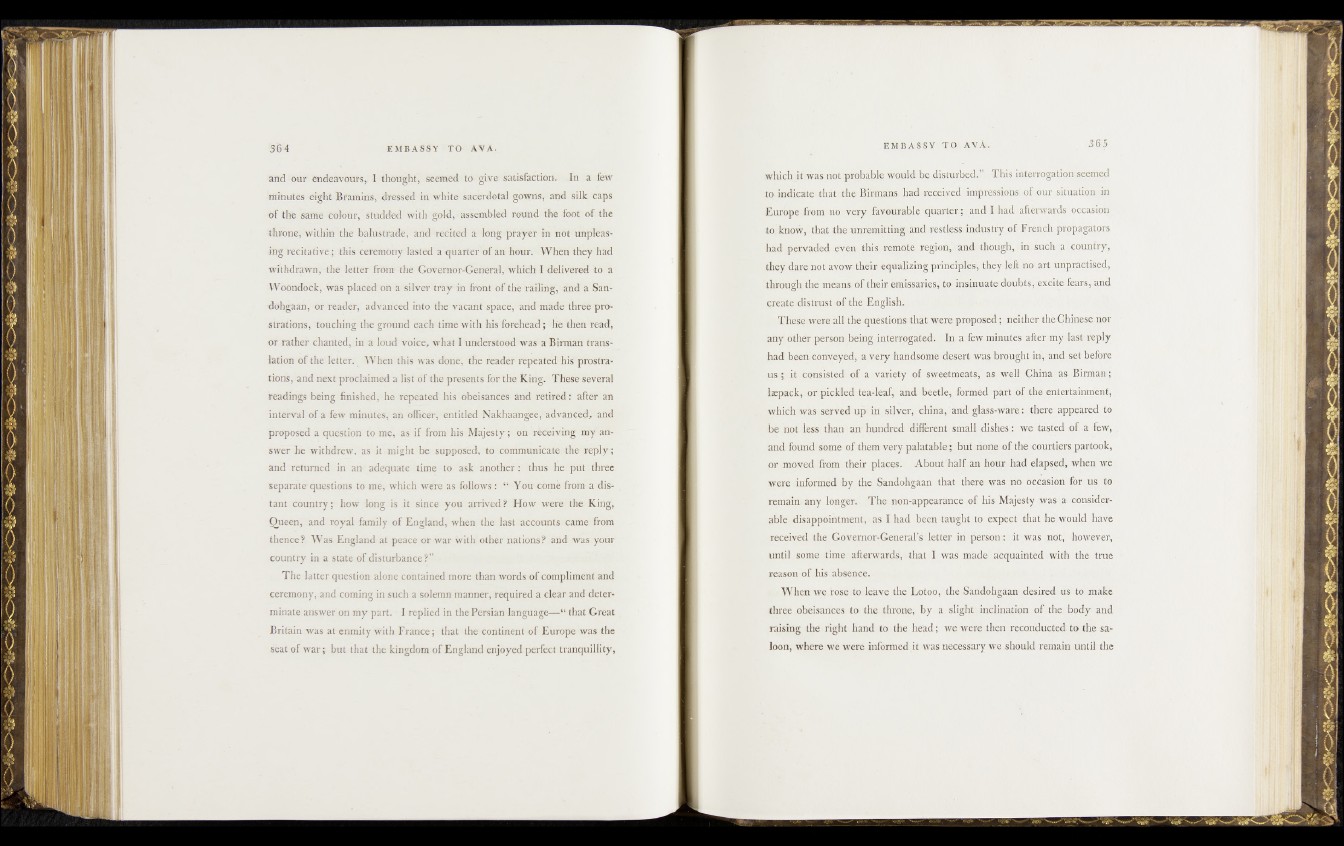
and our endeavours,; I thought, seetaed; to .give» fhtisfaction, In a few
iSitiMtes eight Btamins, dressed in while sacerdotal gowns, I arid silk caps
Of thé same Colour, studded with gold, assembled round the feet of the
Aronev wîtlh® thë fealns®CÉË, and-recited a long prayer in not uftpfeas*
Jiig recitative ;. this ceremony lasted a quarter of an te tïr. When they had
withdrawn,-ffiê letter from the GcwemordSejheral,-^which I delivered to a
Woondock, was placed on a silver tray in front o f the railing, and a S tt -
dohgaan, or reader, advanced into the vacant space, and made three prostrations,
touching the ground each time with his forehead ; he then read,
o r rather chanted,.in a loud voice, what I understood was a Birman translation
of the letter. When this was done, the reader repeated his prostrations,
and next proclaimed a list Of the presents for the King. These several
•readings being finished, he repeated his obeisances and retired: after an
interval of a few -minutes, an officer, entitled Nakhaangee, advanced, and
proposed a question to me, as if from his Majesty ; on receiving gmy an-
swerTie withdrew, as it-might be supposed, to communicate the reply ;
and returned in an adequate time to ask another : thus he put three
separate- questions to me, which were as follows : “ Y ou come from a distant
country; how long is it since you arrived? How were the King,
Queen, and royal family of England, when the last accounts came from
thence? Was England at peace or war with other nations? and was your
country in a state o'f disturbance ?” -
The latter question alone contained more than words of compliment and
ceremony, and coming in such a solemn manner, required a clear and determinate
answer .onmy part. I replied in the Persian language—“ that Great
Britain was at enmity with France; that the continent of Europe was the
seat of w a r; but that the kingdom of England enjoyed perfect tranquillity,
which it was nottóAaMê waidd'jb^Astól^dfeïb This inlerrogataonrseemed
to. indicate^?hat‘:the Birmans, had.,received impre^stfefishof our situation in
Europe froHrmovyery 'f^y^i;able.^Baa|t|e^t;\and I had afterwards occasidfe-
to. know, that j;he!Uniwm#taia,g and! restle^infdpstjy of Trench propagators
hacl pejiY.^ded-cvcitebifcjns ïeiji^tej i.i_ giond’ and|ithoiig^, |foj^ölas'^|.rc0U-titry1
they dare notx avow..their» equalizing prii icipfosi tllOyTeffc na^art tinprastised,
thraugfrthe means of thei^k®i^;fes^t<^nsiasiua’tetdopbte^ex^t0jfears, and
create ^distrust tc^%l,e:TkLgMshv i-pt
• These were all the questionsAbatwpr’ê proposed; n©it|9Si|th^h|nes^noi-
any other person being ■•interrogated, afterony fast’ reply
had heem conveyed, a yerj^handsome d’es'ertiwashroughtrii$ and, set before
jr s ; it consisted of a variety of sweetmeats, as weMc^h^na^as Birman^
laepack, or pickled tea-leaf, and beetle, fempdjpart ofajhèjqütereaiiïm'en^
-^hichwi®- served .up in süv^<^^fia;.ï:andkglass-warfr:>?&Kere-'appeij>red to
'net less than-an'hundred different small dishes: we,tainted/qf.aTew,
and found-some of them very palatable; butjrisne o f thefcourtiprspartook,
o r jno-yed. Trom their places. About 'half an hour- had* elapsed; «when we
were informed-by the rSandohgaan that there was spi: oeoiis Lcni.' for us to
remain- any longer, The non-appearance o f'h is Majesty ^vas .a considers-
able disappointment, as I had been «taught sto expect that hewould.>havp
"received the Governor-General’s, letter.irL person«: it was -not-; however,
until some time afterwards, that I was made .acquainted with .fch&/fö^e
reasoniof .’his absence,
i When we rose1-to leave.the'Lotoo, the Sandohgaan -desired ès>.to;anake
three obeisances to the throne, by a slight--'inclination of the body and
raising the right-hand to the head; we-were'-thenaecWduetetkto the sa*-
loon, where we were ihformed.it was necessary we^shouldoremain .until the